Burt A. The Evolution of the British Empire and Commonwealth From the American Revolution
Подождите немного. Документ загружается.

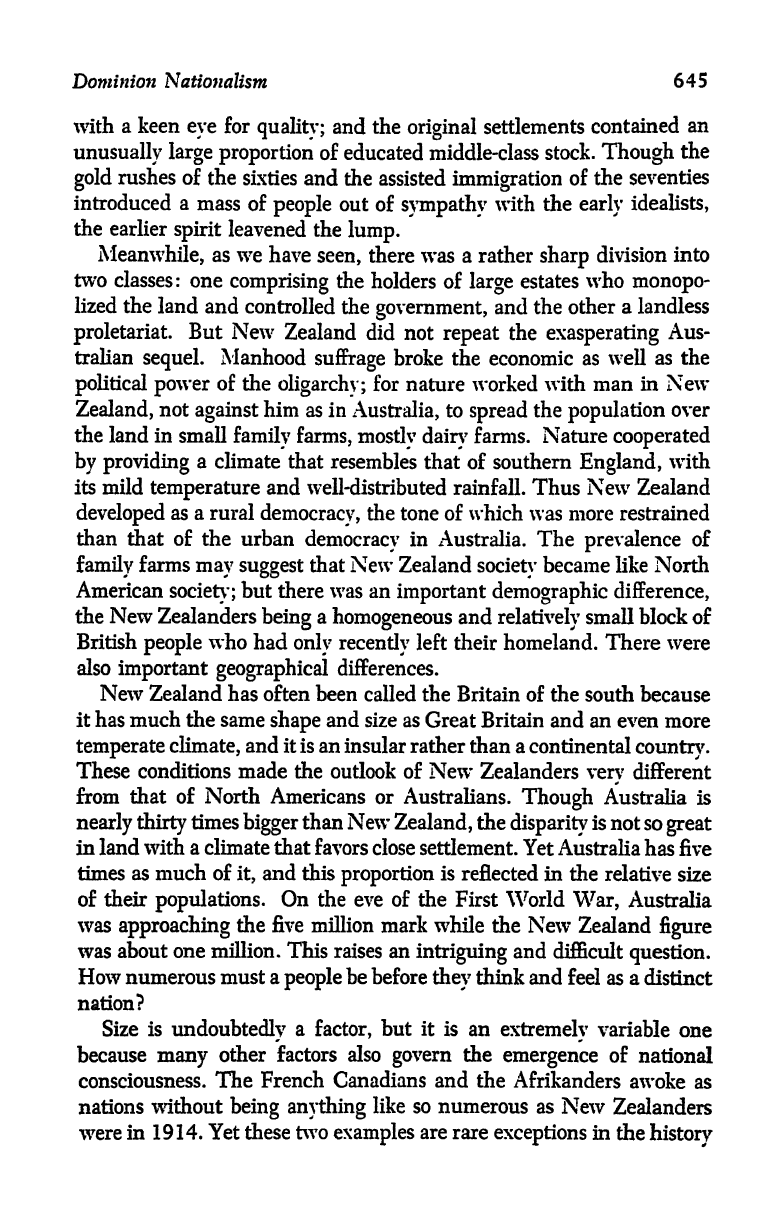
Dominion Nationalism
645
with
a
keen
eye
for
quality;
and
the
original
settlements
contained
an
unusually large
proportion
of educated middle-class
stock.
Though
the
gold
rushes
of the sixties
and the assisted
immigration
of
the seventies
introduced
a
mass
of
people
out
of
sympathy
with the
early
idealists,
the earlier
spirit
leavened the
lump.
Meanwhile,
as
we have
seen,
there was
a rather
sharp
division
into
two
classes: one
comprising
the
holders of
large
estates
who
monopo-
lized the
land
and
controlled the
government,
and
the other
a landless
proletariat.
But
New
Zealand
did
not
repeat
the
exasperating
Aus-
tralian
sequel.
Manhood
suffrage
broke the economic
as
well
as
the
political
power
of the
oligarch}*;
for
nature worked
with
man in New
Zealand,
not
against
him as in
Australia,
to
spread
the
population
over
the
land
in
small
family
farms,
mostly dairy
farms.
Nature
cooperated
by
providing
a
climate that
resembles that of southern
England,
with
its
mild
temperature
and well-distributed
rainfall.
Thus New Zealand
developed
as
a rural
democracy,
the
tone
of
which was more restrained
than
that of the
urban
democracy
in Australia. The
prevalence
of
family
farms
may
suggest
that
New Zealand
society
became like North
American
society;
but
there was an
important
demographic
difference,
the
New
Zealanders
being
a
homogeneous
and
relatively
small
block of
British
people
who
had
only
recently
left their homeland. There were
also
important
geographical
differences.
New Zealand
has
often
been called
the
Britain
of the south
because
it has
much the
same
shape
and size as
Great Britain and an
even more
temperate
climate,
and it is an
insular rather than a
continental
country.
These conditions made the
outlook of New
Zealanders
very
different
from
that of
North Americans
or
Australians.
Though
Australia
is
nearly
thirty
times
bigger
than New
Zealand,
the
disparity
is
not
so
great
in land
with a climate that
favors close
settlement.
Yet Australia has
five
times as much of
it,
and this
proportion
is
reflected
in the
relative
size
of their
populations.
On the eve of the
First World
War,
Australia
was
approaching
the five million
mark while the New
Zealand
figure
was
about one million.
This raises an
intriguing
and
difficult
question.
How
numerous
must a
people
be
before
they
think and
fed
as
a
distinct
nation?
Size
is
undoubtedly
a
factor,
but
it is an
extremely
variable
one
because
many
other
factors also
govern
the
emergence
of
national
consciousness.
The
French
Canadians
and
the
Afrikanders
awoke as
nations
without
being anything
like so
numerous as
New
Zealanders
were
in 1914. Yet these
two
examples
are
rare
exceptions
in
the
history
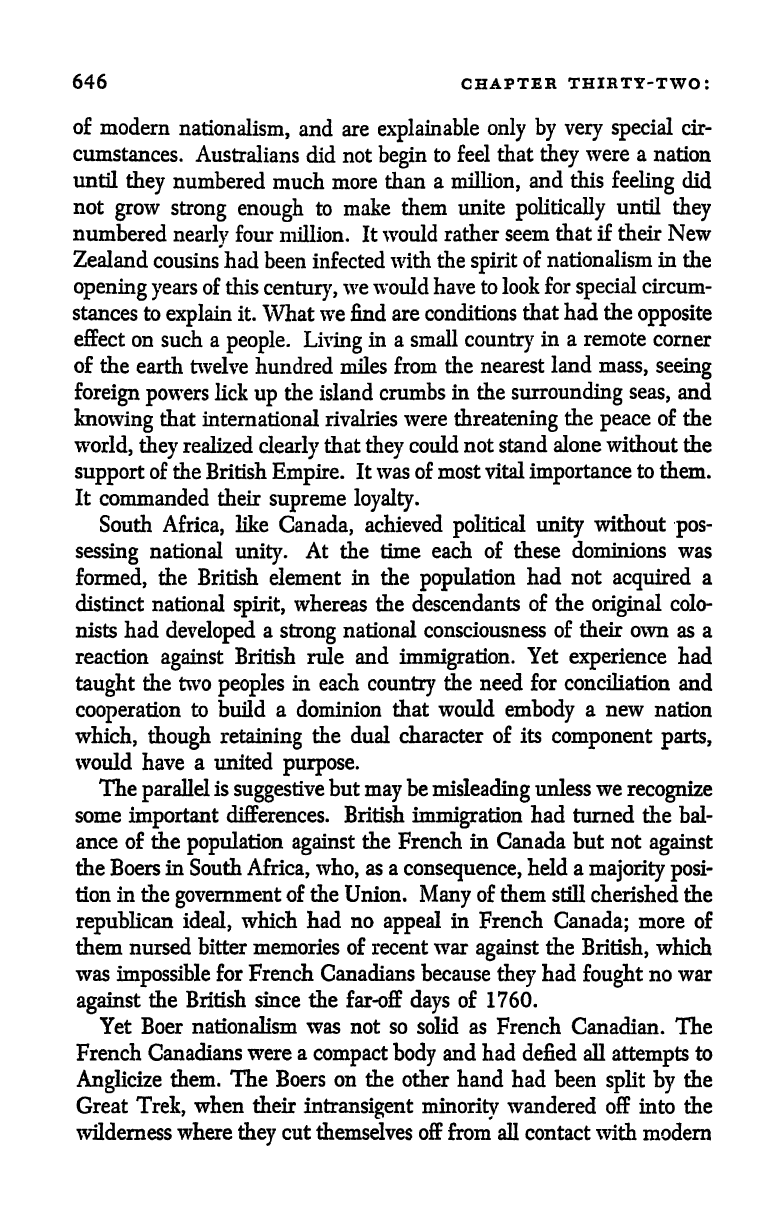
646
CHAPTER THIRTY-TWO:
o
modern
nationalism,
and are
explainable
only
by very
special
cir-
cumstances.
Australians did not
begin
to
feel
that
they
were a
nation
until
they
numbered
much more
than
a
million,
and this
feeling
did
not
grow
strong
enough
to make
them
unite
politically
until
they
numbered
nearly
four
million. It
would
rather
seem
that if their New
Zealand
cousins
had been
infected
with
the
spirit
of
nationalism
in
die
opening
years
of this
century,
we
would
have to look
for
special
circum-
stances to
explain
it.
What
we find
are conditions
that had the
opposite
effect
on
such a
people.
Living
in a small
country
in
a remote
corner
of
the
earth
twelve
hundred miles from
the
nearest
land
mass,
seeing
foreign
powers
lick
up
the island
crumbs
in the
surrounding
seas,
and
knowing
that
international
rivalries
were
threatening
the
peace
of the
world,
they
realized
clearly
that
they
could
not stand
alone
without
the
support
of the British
Empire.
It
was of most vital
importance
to
them.
It
commanded their
supreme
loyalty.
South
Africa,
like
Canada,
achieved
political
unity
without
pos-
sessing
national
unity.
At
the time
each of these
dominions
was
formed,
the British element in the
population
had not
acquired
a
distinct national
spirit,
whereas the descendants
of the
original
colo-
nists
had
developed
a
strong
national consciousness
of their own
as a
reaction
against
British rule and
immigration.
Yet
experience
had
taught
the
two
peoples
in each
country
die need for
conciliation
and
cooperation
to build a dominion
that
would
embody
a
new
nation
which,
though
retaining
the dual character of its
component
parts,
would
have
a united
purpose.
The
parallel
is
suggestive
but
may
be
misleading
unless
we
recognize
some
important
differences. British
immigration
had
turned die bal-
ance of the
population
against
die French in Canada but not
against
the Boers
in
Soudi
Africa, who,
as
a
consequence,
held a
majority posi-
tion
in die
government
of the Union.
Many
of
diem
still cherished the
republican
ideal,
which had
no
appeal
in
French
Canada;
more
of
diem nursed
bitter memories
of
recent war
against
the
British,
which
was
impossible
for French
Canadians
because
diey
had
fought
no
war
against
die
British since the
far-off
days
of 1760.
Yet Boer nationalism was not so solid
as French Canadian.
The
French
Canadians
were
a
compact
body
and had defied all
attempts
to
Anglicize
diem.
The Boers
on
the other
hand had
been
split
by
die
Great
Trek,
when their
intransigent
minority
wandered off
into die
wilderness
where
they
cut
themselves
off
from all contact
with modern
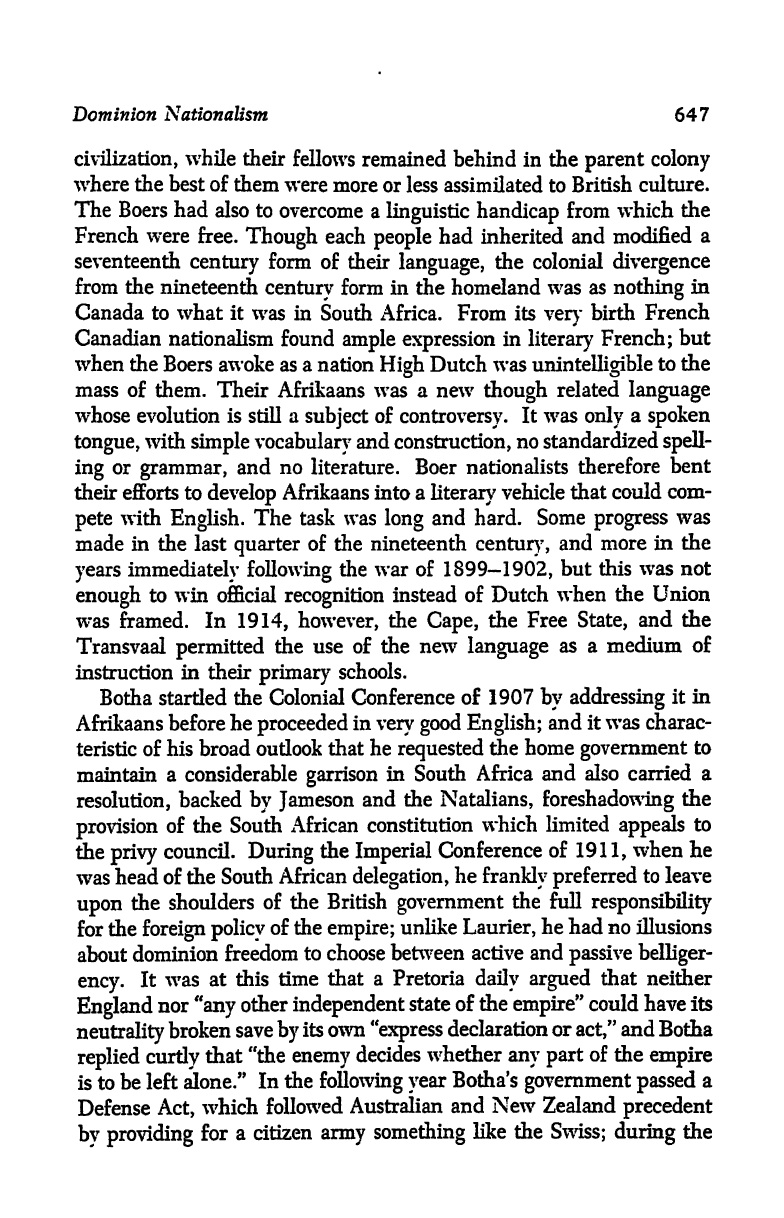
Dominion
Nationalism
647
civilization,
while their
fellows remained
behind in
the
parent
colony
where
the
best of
them
were more or less
assimilated
to British
culture.
The
Boers
had
also to
overcome
a
linguistic handicap
from
which
the
French
were
free.
Though
each
people
had inherited
and modified
a
seventeenth
century
form
of
their
language,
the colonial
divergence
from the
nineteenth
century
form
in the
homeland
was
as
nothing
in
Canada
to
what
it
was in
South Africa. From its
very
birth
French
Canadian
nationalism
found
ample
expression
in
literary
French;
but
when
the
Boers awoke as a
nation
High
Dutch was
unintelligible
to the
mass
of them. Their
Afrikaans
was a new
though
related
language
whose
evolution
is still
a
subject
of
controversy.
It
was
only
a
spoken
tongue,
with
simple vocabulary
and
construction,
no
standardized
spell-
ing
or
grammar,
and no literature. Boer nationalists
therefore
bent
their
efforts to
develop
Afrikaans
into
a
literary
vehicle
that
could
com-
pete
with
English.
The
task
was
long
and hard.
Some
progress
was
made
in
the
last
quarter
of
the nineteenth
century,
and
more in
the
years
immediately
following
the
war of
1899-1902,
but
this was
not
enough
to win official
recognition
instead of Dutch
when
the Union
was framed.
In
1914,
however,
the
Cape,
the
Free
State,
and the
Transvaal
permitted
the use of
the
new
language
as a medium of
instruction
in their
primary
schools.
Botha
startled
the
Colonial
Conference
of 1907
by addressing
it
in
Afrikaans
before
he
proceeded
in
very
good English;
and it
was charac-
teristic of his broad
outlook
that he
requested
the
home
government
to
maintain
a considerable
garrison
in
South
Africa
and also carried
a
resolution,
backed
by
Jameson
and
the
Natalians,
foreshadowing
the
provision
of the South
African constitution
which limited
appeals
to
the
privy
council.
During
the
Imperial
Conference
of 191
1,
when he
was
head
of the
South
African
delegation,
he
frankly
preferred
to leave
upon
the
shoulders
of the British
government
the full
responsibility
for
the
foreign
policy
of the
empire;
unlike
Laurier,
he had no illusions
about
dominion
freedom
to choose between
active and
passive
belliger-
ency.
It
was
at
this
time
that a Pretoria
daily argued
that neither
England
nor
"any
other
independent
state of
the
empire"
could have its
neutrality
broken
save
by
its own
"express
declaration or
act,"
and
Botha
replied
curdy
that
"the
enemy
decides
whether
any
part
of the
empire
is to
be left
alone."
In
the
following
year
Botha's
government
passed
a
Defense
Act,
which
followed
Australian
and
New Zealand
precedent
by providing
for
a citizen
army
something
like
the
Swiss;
during
the
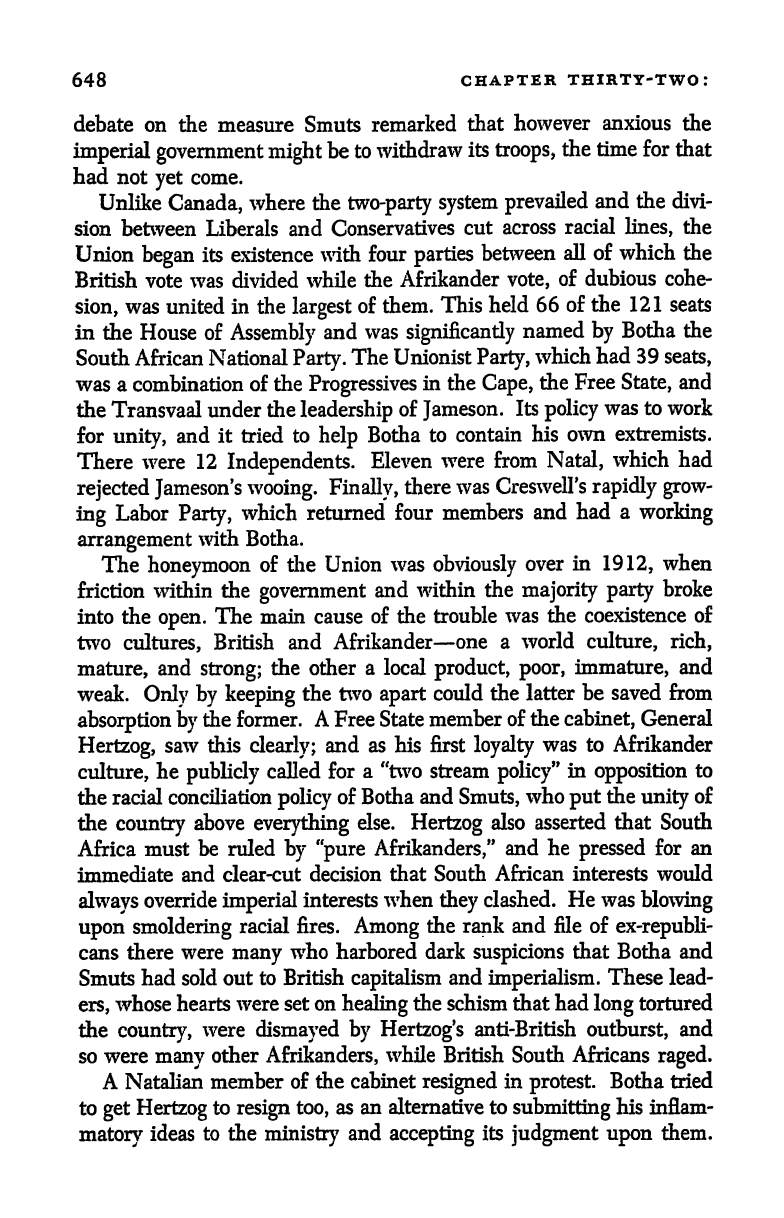
648
CHAPTER
THIRTY-TWO:
debate on
the measure Smuts
remarked
that
however
anxious
the
imperial
government might
be
to
withdraw
its
troops,
the time for
that
had not
yet
come.
Unlike
Canada,
where the
two-party
system
prevailed
and the
divi-
sion
between Liberals and
Conservatives
cut
across
racial
lines,
the
Union
began
its existence
with
four
parties
between
all of
which
the
British vote was divided
while
the
Afrikander
vote,
of
dubious cohe-
sion,
was united in the
largest
of
them.
This
held
66
of
the 121
seats
in the House of
Assembly
and was
significantly
named
by
Botha
the
South African National
Party.
The
Unionist
Party,
which
had 39
seats,
was a combination
of the
Progressives
in
the
Cape,
the Free
State,
and
the Transvaal
under
the
leadership
of
Jameson.
Its
policy
was to
work
for
unity,
and
it tried to
help
Botha
to contain
his
own extremists.
There
were
12
Independents.
Eleven
were from
Natal,
which
had
rejected
Jameson's
wooing.
Finally,
there
was Creswell's
rapidly
grow-
ing
Labor
Party,
which
returned
four
members
and had
a
working
arrangement
with
Botha.
The
honeymoon
of the
Union
was
obviously
over
in
1912,
when
friction
within
the
government
and
within the
majority
party
broke
into the
open.
The
main cause
of
the
trouble
was
the coexistence of
two
cultures,
British and Afrikander
one a
world
culture,
rich,
mature,
and
strong;
the
other
a
local
product,
poor,
immature,
and
weak.
Only
by
keeping
the two
apart
could
the latter
be
saved
from
absorption by
die former.
A Free State
member
of the
cabinet,
General
Hertzog,
saw
this
clearly;
and as his
first
loyalty
was to Afrikander
culture,
he
publicly
called for
a
"two stream
policy"
in
opposition
to
the
racial conciliation
policy
of Botha
and
Smuts,
who
put
the
unity
of
the
country
above
everything
else.
Hertzog
also
asserted that
South
Africa must
be ruled
by "pure
Afrikanders,"
and he
pressed
for an
immediate
and clear-cut
decision
that
South
African interests
would
always
override
imperial
interests
when
they
clashed.
He
was
blowing
upon
smoldering
racial
fires.
Among
the rank and file of
ex-republi-
cans
there
were
many
who
harbored
dark
suspicions
that Botha
and
Smuts
had sold out
to British
capitalism
and
imperialism.
These lead-
ers,
whose
hearts
were set
on
heeding
the schism that
had
long
tortured
the
country,
were
dismayed by
Hertzog's
anti-British
outburst,
and
so
were
many
other
Afrikanders,
while British
South Africans
raged.
A Natalian
member
of the
cabinet
resigned
in
protest.
Botha tried
to
get
Hertzog
to
resign
too,
as an alternative to
submitting
his inflam-
matory
ideas
to the
ministry
and
accepting
its
judgment upon
them.
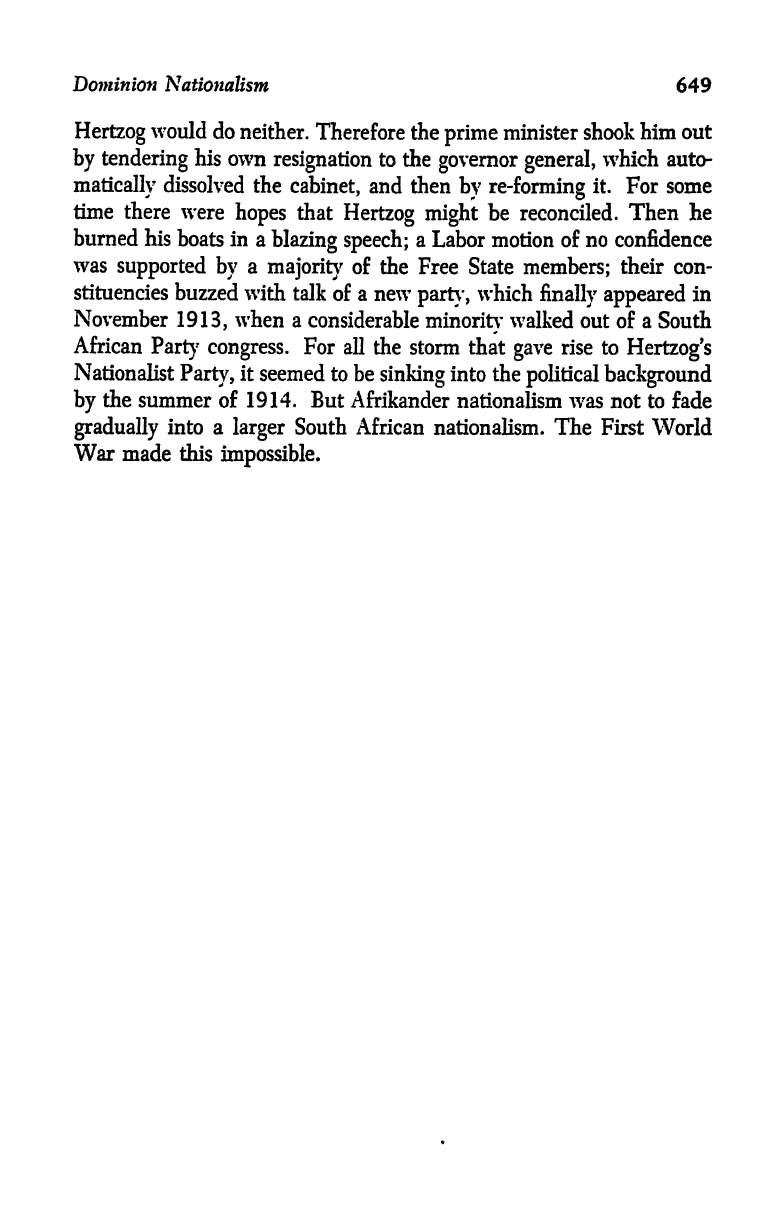
Dominion
Nationalism
649
Hertzog
would
do
neither.
Therefore the
prime
minister shook
him
out
by
tendering
his own
resignation
to the
governor general,
which auto-
matically
dissolved the
cabinet,
and
then
by re-forming
it.
For
some
time there
were
hopes
that
Hertzog might
be reconciled.
Then he
burned
his
boats
in
a
blazing
speech;
a
Labor motion
of no confidence
was
supported
by
a
majority
of
the
Free State
members;
their
con-
stituencies
buzzed
with talk
of a
new
party,
which
finally appeared
in
November
1913,
when a
considerable
minority
walked
out
of
a
South
African
Party
congress.
For
all the storm that
gave
rise
to
Hertzog's
Nationalist
Party,
it seemed
to
be
sinking
into the
political
background
by
the
summer
of 1914. But Afrikander
nationalism was not
to
fade
gradually
into
a
larger
South African
nationalism. The First
World
War
made this
impossible.
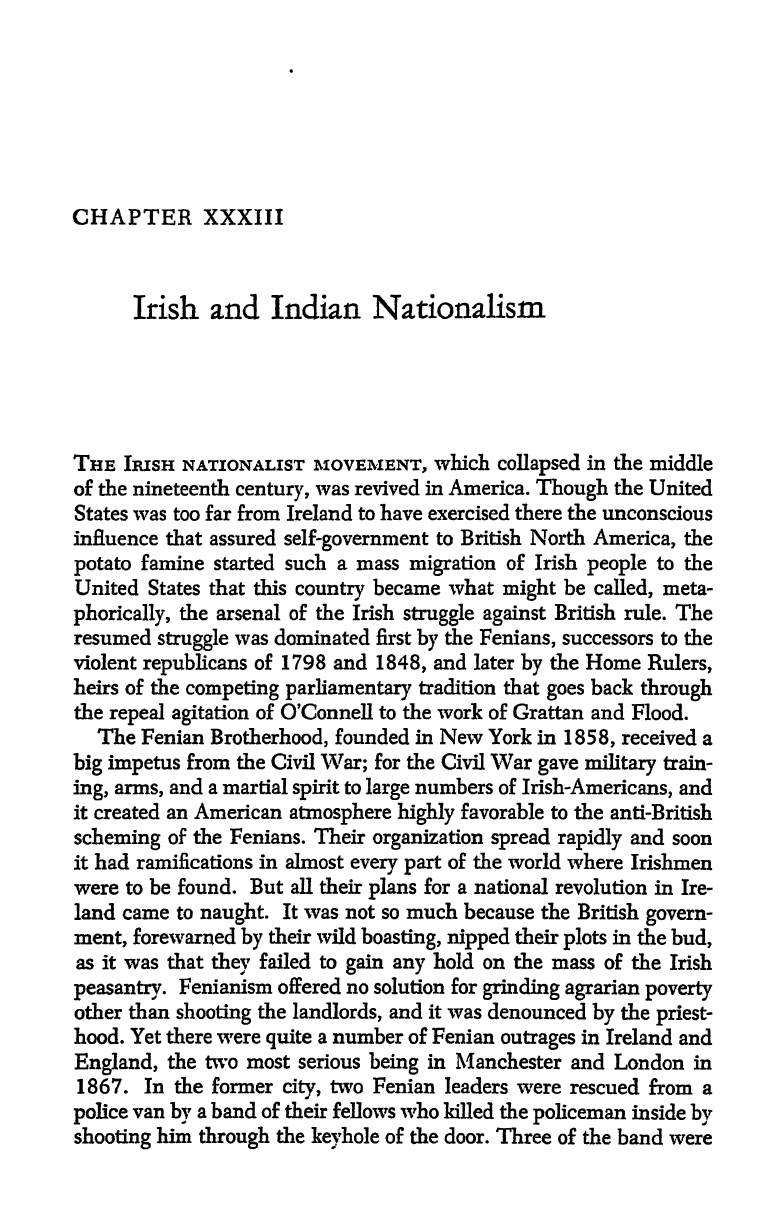
CHAPTER XXXIII
Irish and Indian
Nationalism
THE IRISH
NATIONALIST
MOVEMENT,
which
collapsed
in the
middle
of
the
nineteenth
century,
was
revived
in America.
Though
the
United
States
was
too
far from
Ireland
to
have
exercised
there the
unconscious
influence that assured
self-government
to
British North
America,
the
potato
famine
started
such a mass
migration
of Irish
people
to
the
United States that this
country
became
what
might
be
called,
meta-
phorically,
the
arsenal
of the Irish
struggle
against
British
rule.
The
resumed
struggle
was
dominated
first
by
die
Fenians,
successors
to
the
violent
republicans
of
1798
and
1848,
and later
by
the
Home
Rulers,
heirs of the
competing parliamentary
tradition
that
goes
back
through
the
repeal
agitation
of
O'Connell to
the
work of
Grattan and
Flood.
The Fenian
Brotherhood,
founded
in New
York in
1858,
received a
big
impetus
from
the
Civil
War;
for the
Civil
War
gave
military
train-
ing,
arms,
and
a
martial
spirit
to
large
numbers
of
Irish-Americans,
and
it created
an American
atmosphere
highly
favorable to the
anti-British
scheming
of
the
Fenians.
Their
organization spread
rapidly
and
soon
it had
ramifications
in
almost
every
part
of the
world
where
Irishmen
were to be found.
But all
their
plans
for a
national
revolution
in Ire-
land came to
naught.
It was not so much because
the
British
govern-
ment,
forewarned
by
their
wild
boasting, nipped
their
plots
in
the
bud,
as it
was that
they
failed to
gain
any
hold on the
mass of
the Irish
peasantry.
Fenianism offered no solution
for
grinding
agrarian
poverty
other
than
shooting
the
landlords,
and it
was
denounced
by
the
priest-
hood.
Yet
there
were
quite
a
number of Fenian
outrages
in
Ireland and
England,
the two most serious
being
in
Manchester
and
London
in
1867.
In
the
former
city,
two Fenian
leaders were
rescued
from
a
police
van
by
a
band
of their
fellows
who
killed the
policeman
inside
by
shooting
him
through
the
keyhole
of
the
door.
Three of the
band were
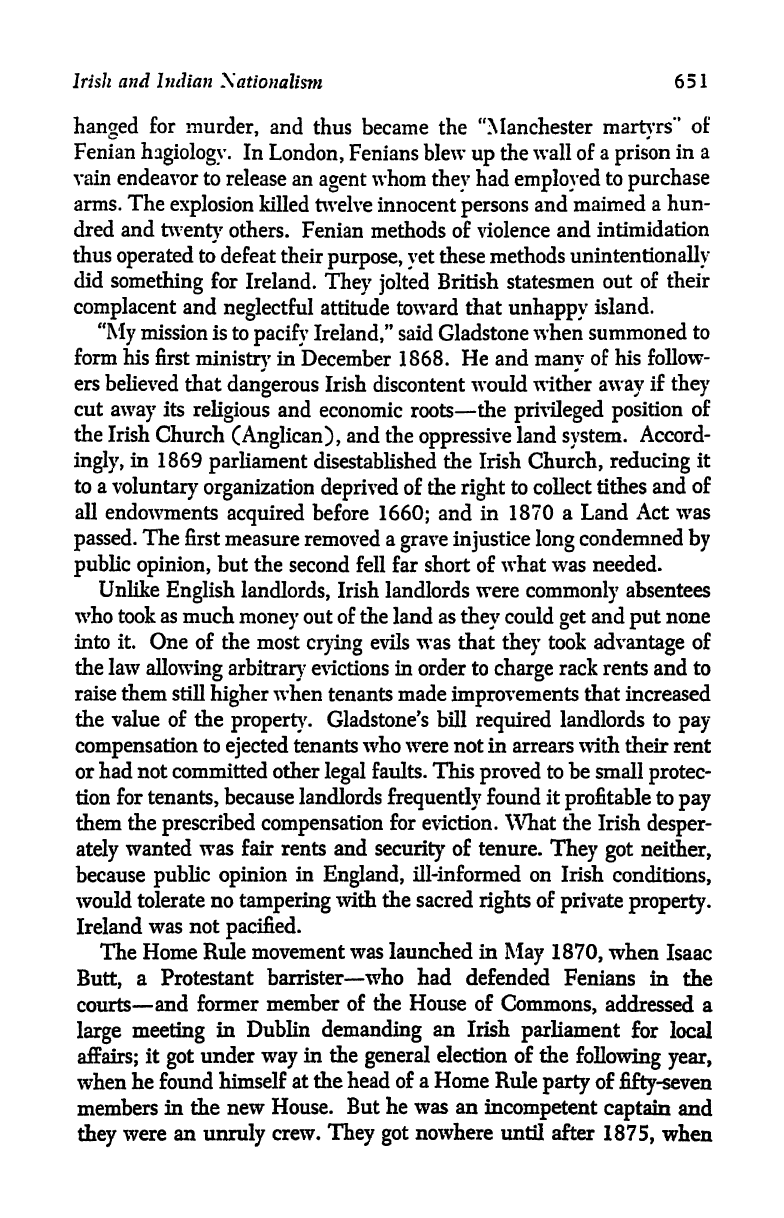
Irish
and Indian
Nationalism
651
hanged
for
murder,
and thus
became the
"Manchester
martyrs"
of
Fenian
hagiology.
In
London,
Fenians blew
up
the wall of
a
prison
in
a
vain endeavor
to
release an
agent
whom
they
had
employed
to
purchase
arms. The
explosion
killed
twelve
innocent
persons
and
maimed
a hun-
dred and
twenty
others.
Fenian methods of
violence
and
intimidation
thus
operated
to
defeat
their
purpose, yet
these
methods
unintentionally
did
something
for
Ireland.
They jolted
British
statesmen
out of
their
complacent
and
neglectful
attitude toward
that
unhappy
island.
"My
mission
is to
pacify
Ireland,"
said
Gladstone
when
summoned
to
form
his
first
ministrv
in
December 1868.
He and manv
of his
follow-
* *
ers
believed
that
dangerous
Irish
discontent
would
wither
away
if
they
cut
away
its
religious
and
economic roots
the
privileged
position
of
the
Irish
Church
(Anglican),
and the
oppressive
land
system.
Accord-
ingly,
in
1869
parliament
disestablished
the
Irish
Church,
reducing
it
to
a
voluntary
organization
deprived
of the
right
to
collect
tithes and
of
all
endowments
acquired
before
1660;
and
in 1870
a Land
Act
was
passed.
The
first
measure
removed
a
grave
injustice long
condemned
by
public opinion,
but
the
second fell far
short
of
what was
needed.
Unlike
English
landlords,
Irish landlords
were
commonly
absentees
who took
as
much
money
out of
the
land
as
they
could
get
and
put
none
into it.
One of
the
most
crying
evils was
that
they
took
advantage
of
the law
allowing
arbitrary
evictions in order
to
charge
rack rents and to
raise them
still
higher
when
tenants
made
improvements
that
increased
the value
of the
property.
Gladstone's bill
required
landlords to
pay
compensation
to
ejected
tenants who
were
not in
arrears
with their rent
or
had not committed other
legal
faults.
This
proved
to be small
protec-
tion
for
tenants,
because landlords
frequently
found it
profitable
to
pay
them
the
prescribed compensation
for
eviction.
What
the Irish
desper-
ately
wanted
was fair rents and
security
of tenure.
They
got
neither,
because
public
opinion
in
England,
ill-informed on Irish
conditions,
would
tolerate
no
tampering
with the sacred
rights
of
private
property.
Ireland
was
not
pacified.
The Home
Rule movement
was launched
in
May
1870,
when
Isaac
Butt,
a Protestant
barrister who had
defended
Fenians in
the
courts
and former
member of
the
House of
Commons,
addressed
a
large
meeting
in
Dublin
demanding
an Irish
parliament
for
local
affairs;
it
got
under
way
in
the
general
election of the
following
year,
when
he found
himself
at the
head of
a
Home
Rule
party
of
fifty-seven
members
in the
new
House.
But he
was
an
incompetent
captain
and
they
were
an
unruly
crew.
They got
nowhere
until after
1875,
when
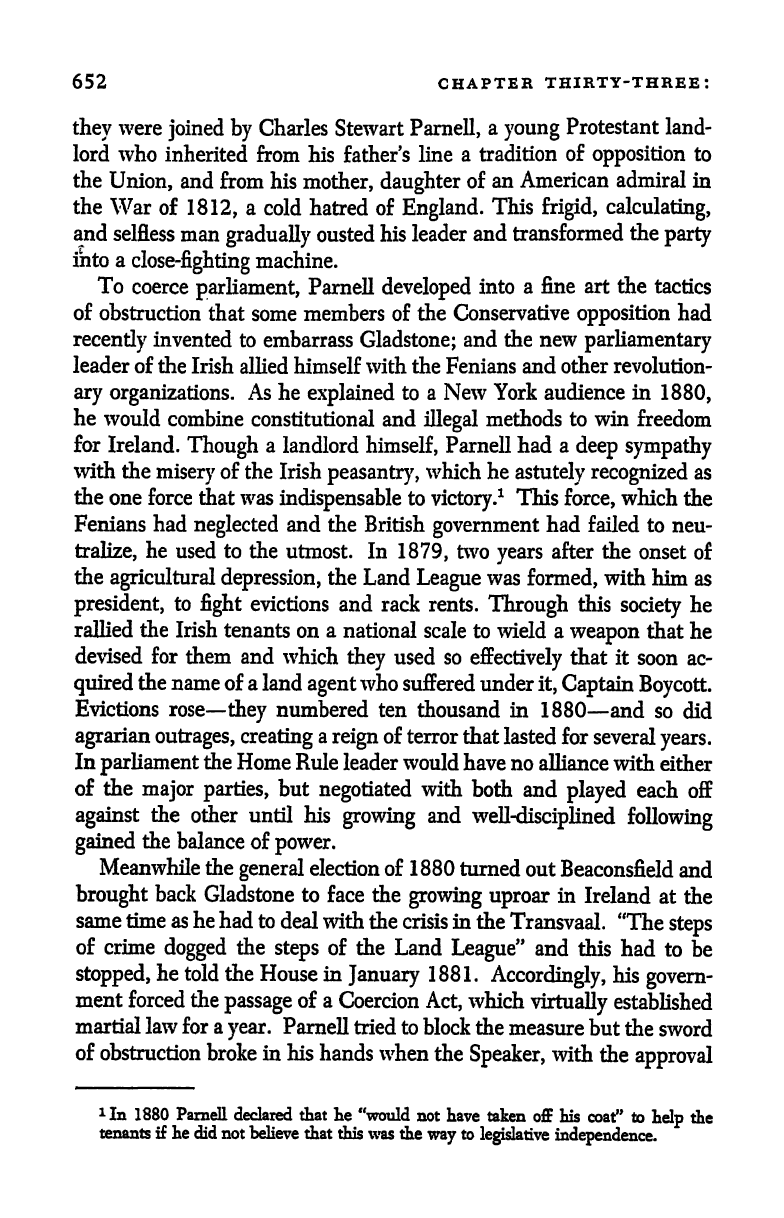
652
CHAPTER
THIRTY-THREE:
they
were
joined
by
Charles
Stewart
Parnell,
a
young
Protestant land-
lord
who inherited
from his
father's
line
a
tradition
of
opposition
to
the
Union,
and from
his
mother,
daughter
of
an
American admiral
in
the
War
of
1812,
a
cold hatred
of
England.
This
frigid,
calculating,
and
selfless
man
gradually
ousted
his
leader
and transformed
the
party
into a
close-fighting
machine.
To
coerce
parliament,
Parnell
developed
into
a
fine
art
the
tactics
of
obstruction that
some members of
the Conservative
opposition
had
recently
invented to
embarrass
Gladstone;
and
the
new
parliamentary
leader
of
the Irish allied himself
with
the
Fenians
and other
revolution-
ary
organizations.
As he
explained
to
a
New
York audience in
1880,
he
would
combine
constitutional
and
illegal
methods to
win
freedom
for
Ireland.
Though
a
landlord
himself,
Parnell had
a
deep
sympathy
with the
misery
of the Irish
peasantry,
which he
astutely
recognized
as
the
one force that was
indispensable
to
victory.
1
This
force,
which
tie
Fenians had
neglected
and the British
government
had failed
to neu-
tralize,
he
used to the
utmost. In
1879,
two
years
after the
onset
of
the
agricultural depression,
the Land
League
was
formed,
with
him
as
president,
to
fight
evictions and rack rents.
Through
this
society
he
rallied
the
Irish
tenants on
a
national
scale to
wield
a
weapon
that
he
devised
for
them and
which
they
used
so
effectively
that it
soon ac-
quired
the name
of a
land
agent
who
suffered under
it,
Captain
Boycott.
Evictions
rose
they
numbered
ten
thousand in 1880
and
so
did
agrarian
outrages,
creating
a
reign
of
terror
that
lasted
for
several
years.
In
parliament
the
Home Rule
leader
would have
no alliance
with
either
of
the
major parties,
but
negotiated
with
both
and
played
each off
against
the
other until
his
growing
and
well-disciplined
following
gained
the
balance of
power.
Meanwhile
the
general
election of 1880
turned
out
Beaconsfield
and
brought
back
Gladstone
to face the
growing
uproar
in
Ireland
at
the
same time
as he had to
deal with
the
crisis in
the
Transvaal.
"The
steps
of crime
dogged
the
steps
of the
Land
League"
and
this had
to be
stopped,
he
told the
House in
January
1881.
Accordingly,
his
govern-
ment forced the
passage
of
a
Coercion
Act,
which
virtually
established
martial law
for
a
year.
Parnell tried to
block
the
measure
but
the
sword
of
obstruction
broke in his hands when
the
Speaker,
with
the
approval
1
In
1880 Parnell declared that
he
"would
not
have
taken off
his
coat
1
'
to
help
the
tenants if he did
not believe
that
this was the
way
to
legislative
independence.
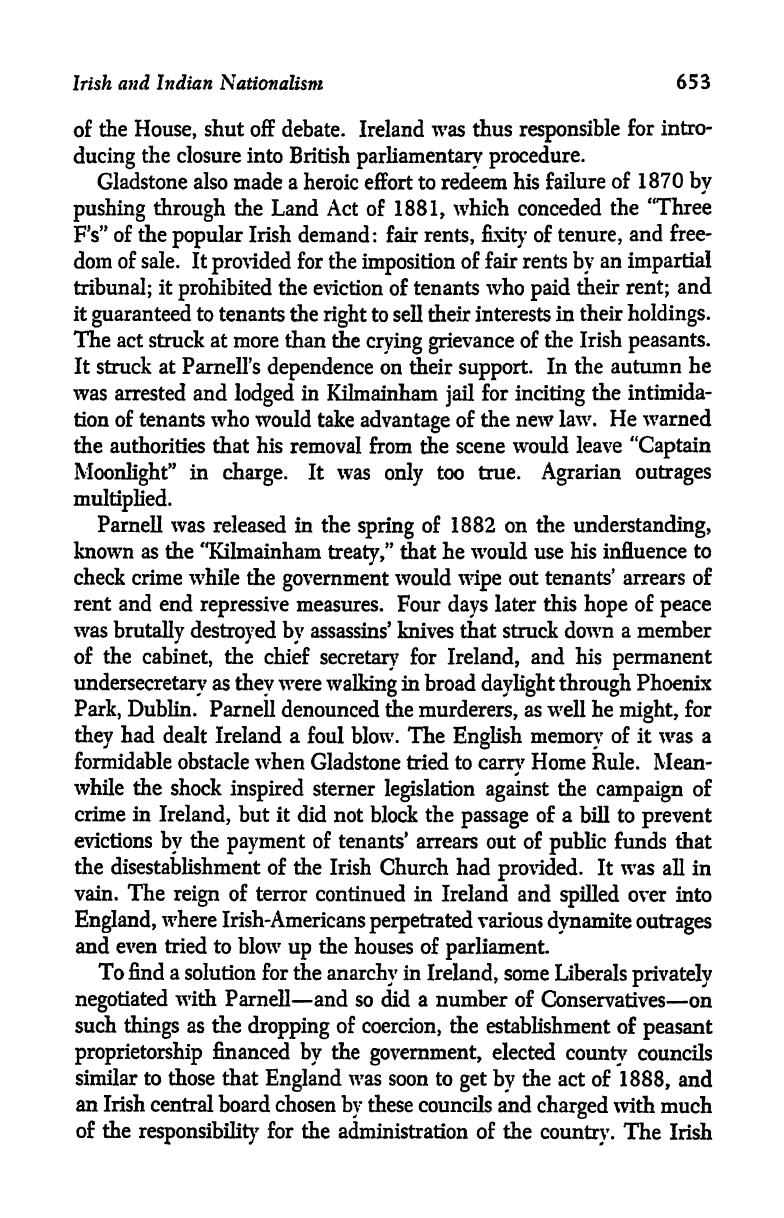
Irish
and Indian
Nationalism
653
of
the
House,
shut
off debate.
Ireland
was
thus
responsible
for
intro-
ducing
the closure into
British
parliamentary
procedure.
Gladstone
also
made
a
heroic
effort
to redeem his
failure
of
1870
by
pushing
through
the
Land Act
of
1881,
which conceded
the
"Three
F's"
of the
popular
Irish demand: fair
rents,
fixity
of
tenure,
and
free-
dom
of sale.
It
provided
for the
imposition
of
fair rents
by
an
impartial
tribunal;
it
prohibited
the
eviction of
tenants who
paid
their
rent;
and
it
guaranteed
to tenants the
right
to
sell
their
interests in
their
holdings.
The act
struck at
more than the
crying
grievance
of
the Irish
peasants.
It
struck
at
Parnell's
dependence
on
their
support.
In
the
autumn
he
was arrested
and
lodged
in
Kilmainham
jail
for
inciting
the
intimida-
tion of
tenants who would
take
advantage
of
the
new law.
He warned
the
authorities
that his
removal from
the
scene would
leave
"Captain
Moonlight"
in
charge.
It
was
only
too
true.
Agrarian
outrages
multiplied.
Parnell was
released
in
the
spring
of 1882 on the
understanding,
known as the
"Kilmainham
treaty,"
that he would use
his
influence
to
check
crime
while
the
government
would
wipe
out
tenants' arrears of
rent
and end
repressive
measures. Four
days
later
this
hope
of
peace
was
brutally destroyed
by
assassins' knives
that struck down
a member
of
the
cabinet,
the chief
secretary
for
Ireland,
and his
permanent
undersecretary
as
they
were
walking
in broad
daylight
through
Phoenix
Park,
Dublin.
Parnell
denounced the
murderers,
as
well he
might,
for
they
had
dealt
Ireland a
foul blow.
The
English
memory
of it
was
a
formidable
obstacle
when
Gladstone tried to
carrv
Home
Rule. Mean-
*
while the
shock
inspired
sterner
legislation
against
the
campaign
of
crime in
Ireland,
but it
did not
block
the
passage
of
a
bill to
prevent
evictions
by
the
payment
of tenants' arrears
out of
public
funds
that
the disestablishment
of
the Irish
Church had
provided.
It was
all in
vain.
The
reign
of
terror
continued
in
Ireland
and
spilled
over
into
England,
where
Irish-Americans
perpetrated
various
dynamite
outrages
and even
tried to
blow
up
the
houses of
parliament.
To find
a
solution for
the
anarchy
in
Ireland,
some
Liberals
privately
negotiated
with
Parnell and
so did
a number
of
Conservatives
on
such
things
as the
dropping
of
coercion,
the
establishment
of
peasant
proprietorship
financed
by
the
government,
elected
county
councils
similar
to those
that
England
was
soon
to
get by
the act
of
1888,
and
an
Irish
central board
chosen
by
these
councils
and
charged
with
much
of
the
responsibility
for the
administration of
the
country.
The
Irish
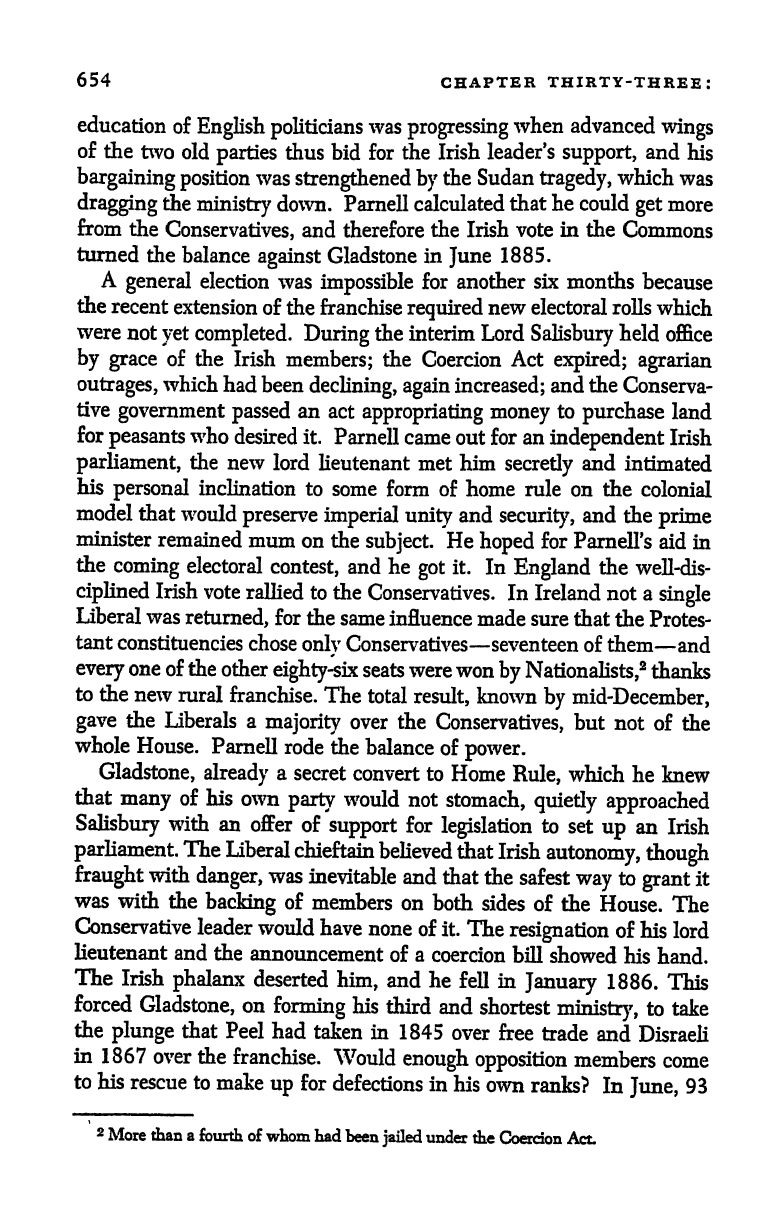
654
CHAPTER
THIRTY-THREE:
education
of
English politicians
was
progressing
when
advanced
wings
of
the
two
old
parties
thus
bid
for
the Irish
leader's
support,
and
his
bargaining
position
was
strengthened
by
the
Sudan
tragedy,
which
was
dragging
the
ministry
down. Parnell
calculated
that he could
get
more
from
the
Conservatives,
and therefore
the
Irish
vote
in the
Commons
turned
the
balance
against
Gladstone
in
June
1885.
A
general
election
was
impossible
for another
six
months
because
the
recent
extension of
the
franchise
required
new electoral
rolls
which
were
not
yet
completed.
During
the interim
Lord
Salisbury
held
office
by
grace
of the
Irish
members;
the Coercion
Act
expired;
agrarian
outrages,
which
had been
declining,
again
increased;
and
the
Conserva-
tive
government
passed
an
act
appropriating
money
to
purchase
land
for
peasants
who
desired it.
Parnell
came
out for
an
independent
Irish
parliament,
the
new
lord
lieutenant
met him
secretly
and
intimated
his
personal
inclination
to some
form of home
rule
on
the
colonial
model
that
would
preserve
imperial
unity
and
security,
and
the
prime
minister
remained
mum
on the
subject.
He
hoped
for Parnell's
aid
in
the
coming
electoral
contest,
and
he
got
it.
In
England
the
well-dis-
ciplined
Irish
vote
rallied
to
the
Conservatives. In Ireland
not
a
single
Liberal
was
returned,
for
the
same
influence made sure
that
the
Protes-
tant
constituencies
chose
only
Conservatives
seventeen
of
them
and
every
one
of
the other
eighty-six
seats
were won
by
Nationalists,
2
thanks
to
the
new
rural
franchise.
The
total
result,
known
by
mid-December,
gave
the
Liberals
a
majority
over
the
Conservatives,
but
not of
the
whole
House.
Parnell
rode
the
balance
of
power.
Gladstone,
already
a
secret
convert to
Home
Rule,
which
he
knew
that
many
of his
own
party
would not
stomach,
quietly
approached
Salisbury
with
an
offer
of
support
for
legislation
to
set
up
an
Irish
parliament.
The
Liberal
chieftain
believed
that
Irish
autonomy,
though
fraught
with
danger,
was
inevitable
and
that
the
safest
way
to
grant
it
was
with
the
backing
of
members on
both
sides
of the
House.
The
Conservative
leader
would have
none
of
it.
The
resignation
of
his
lord
lieutenant
and
the
announcement of
a
coercion
bill
showed
his
hand.
The
Irish
phalanx
deserted
him,
and he
fell
in
January
1886.
This
forced
Gladstone,
on
forming
his
third
and
shortest
ministry,
to
take
the
plunge
that
Peel
had
taken in
1845
over
free
trade
and
Disraeli
in
1867
over
the
franchise.
Would
enough
opposition
members come
to
his rescue
to
make
up
for
defections
in
his
own
ranks?
In
June,
93
2
More than a
fourth
of
whom
had
been
jailed
under
the
Coercion
ACL
